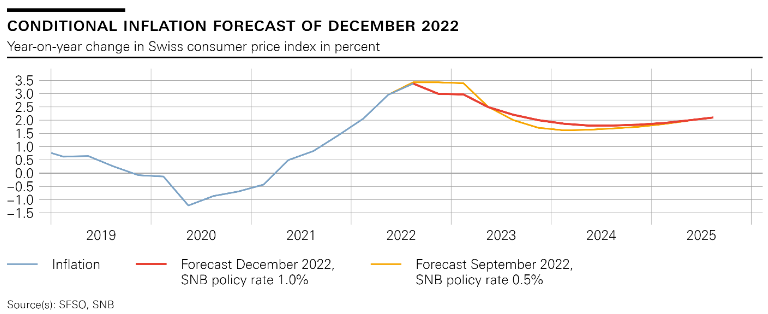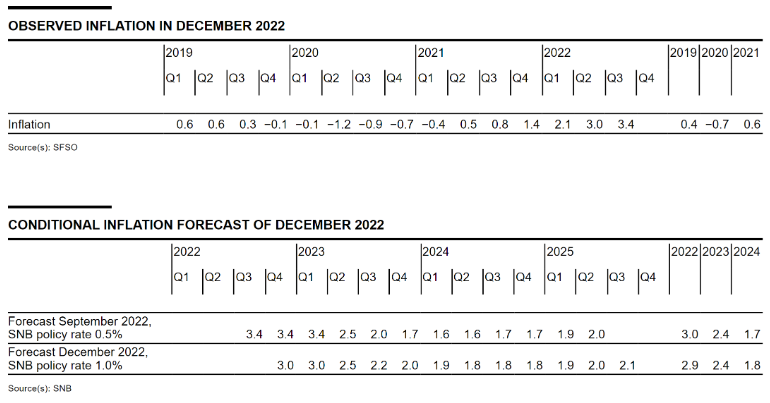Swiss National Bank tightens monetary policy further and raises SNB policy rate to 1.0% The SNB is tightening its monetary policy further and is raising the SNB policy rate by 0.5 percentage points to 1.0%. In doing so, it is countering increased inflationary pressure and a further spread of inflation. It cannot be ruled out that additional rises in the SNB policy rate will be necessary to ensure price stability over the medium term. To provide appropriate monetary conditions, the SNB is also willing to be active in the foreign exchange market as necessary. The SNB policy rate change applies from tomorrow, 16 December 2022. Banks’ sight deposits held at the SNB will be remunerated at the SNB policy rate of 1.0% up to a certain threshold. Sight deposits above this
Topics:
Swiss National Bank considers the following as important: 1.) SNB Press Releases, 1) SNB and CHF, Featured, newsletter
This could be interesting, too:
Nachrichten Ticker - www.finanzen.ch writes Die Performance der Kryptowährungen in KW 9: Das hat sich bei Bitcoin, Ether & Co. getan
Nachrichten Ticker - www.finanzen.ch writes Wer verbirgt sich hinter der Ethereum-Technologie?
Martin Hartmann writes Eine Analyse nach den Lehren von Milton Friedman
Marc Chandler writes March 2025 Monthly
| Swiss National Bank tightens monetary policy further and raises SNB policy rate to 1.0% The SNB is tightening its monetary policy further and is raising the SNB policy rate by 0.5 percentage points to 1.0%. In doing so, it is countering increased inflationary pressure and a further spread of inflation. It cannot be ruled out that additional rises in the SNB policy rate will be necessary to ensure price stability over the medium term. To provide appropriate monetary conditions, the SNB is also willing to be active in the foreign exchange market as necessary.
The SNB policy rate change applies from tomorrow, 16 December 2022. Banks’ sight deposits held at the SNB will be remunerated at the SNB policy rate of 1.0% up to a certain threshold. Sight deposits above this threshold will be remunerated at an interest rate of 0.5%, and thus still at a discount of 0.5 percentage points relative to the SNB policy rate. With this tiered remuneration of sight deposits and open market operations, the SNB is ensuring that the secured short-term Swiss franc money market rates are close to the SNB policy rate. Inflation has declined somewhat in recent months, and stood at 3.0% in November. However, it is still clearly above the range the SNB equates with price stability. Inflation is likely to remain elevated for the time being. The SNB’s new conditional inflation forecast is based on the assumption that the SNB policy rate is 1.0% over the entire forecast horizon (cf. chart 1). Up to the beginning of 2023, the forecast is below that of September owing to the somewhat lower oil price. From mid-2023 onwards, the new forecast is higher and stands at 2.1% at the end of the forecast horizon. That the new forecast is higher over the medium term despite the raising of the SNB policy rate is attributable to stronger inflationary pressure from abroad and the fact that price increases are spreading across the various categories of goods and services in the consumer price index. The new forecast puts average annual inflation at 2.9% for 2022, 2.4% for 2023 and 1.8% for 2024 (cf. table 1). Without today’s SNB policy rate increase, the inflation forecast would be even higher over the medium term. Global growth momentum has continued to slow down. At the same time, inflation in many countries is markedly above central banks’ targets. Accordingly, numerous central banks have further tightened their monetary policy. |
|
| In its baseline scenario for the global economy, the SNB expects this challenging situation to persist for now. Global economic growth is likely to be weak in the coming quarters, and inflation will remain elevated for the time being. Over the medium term, however, inflation abroad should return to more moderate levels, not least due to the increasingly tighter monetary policy in many countries. This scenario for the global economy is subject to significant risks. The energy situation in Europe could worsen again. At the same time, high inflation could become embedded and require renewed stronger monetary policy responses abroad. Finally, the coronavirus pandemic remains an important source of risk for the global economy. In Switzerland, GDP grew at an annualised rate of 1.0% in the third quarter. Economic momentum thus remained similarly modest as in the preceding quarters. While many service industries fared well, there was a renewed slight decline in value added in manufacturing. The situation on the labour market remained positive. Employment continued to rise, and unemployment decreased again slightly. Overall production capacity has been well utilised. Switzerland’s GDP is likely to grow by around 2.0% this year. However, weaker demand from abroad and the high energy prices are likely to curb economic activity markedly in the coming year. Against this backdrop, the SNB expects GDP growth of around 0.5% for 2023. The forecast for Switzerland, as for the global economy, is subject to high uncertainty. A stronger economic downturn abroad or a pronounced energy shortage in Switzerland would, in particular, have a negative effect. Growth has remained largely unchanged in recent quarters for both mortgage lending and prices for single-family houses and privately owned apartments. There are, however, signs of a slowdown in prices for apartment buildings. The SNB will continue to monitor developments on the mortgage and real estate markets closely. |
More detailed information on the monetary policy decision can be found in Thomas Jordan’s introductory remarks. Further information can be found in the introductory remarks of Martin Schlegel and Andréa Maechler.
Tags: Featured,newsletter


